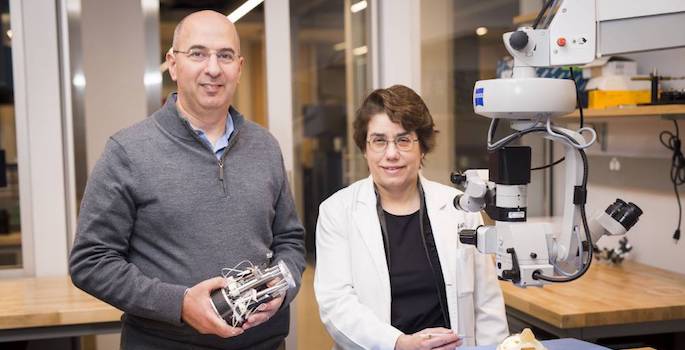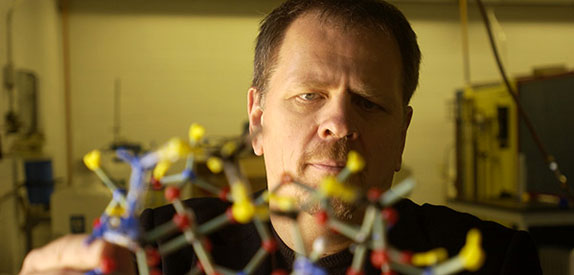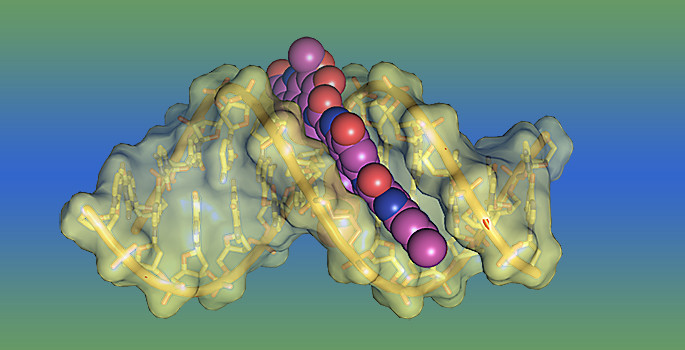Research
-

New tool may speed antibody, vaccine research
Antibody discovery and vaccine development research may be on the verge of rapidly expanding with data that previously took decades to acquire, thanks to LIBRA-seq, a new tool developed by Vanderbilt University researchers and their colleagues. Read MoreDec 12, 2019
-

Gregor Mendel would be proud
A computational method that uses hospital billing codes and electronic health records can identify genetic disease cases before clinical teams do. Read MoreDec 12, 2019
-

Study reveals mysteries of critical brain receptor complex
Poorly functioning AMPARs have been linked to a wide range of neurological and psychiatric disorders including seizures, Alzheimer’s disease, major depression and autism spectrum disorder. Understanding how AMPARs are formed and operate is essential for the rational design of pharmacological compounds that, by tuning AMPAR activity up or down, could improve treatment of these conditions. Read MoreDec 5, 2019
-

Genetic screen in worms reveals critical step in insulin synthesis
The identification of a protein important for insulin synthesis may hold clues for understanding the pathogenesis of diabetes. Read MoreDec 4, 2019
-

Study finds ‘frozen’ fear response may underlie PTSD
To explore how fear becomes entrenched, VUMC researchers traveled down the precise neuronal pathways in the brains of mice that trigger fear responses, and which normally extinguish the behaviors once the danger has passed. Read MoreNov 27, 2019
-

Study explores potential new class of antidepressants
Researchers at VUMC have taken a major step that could ultimately facilitate development of a new class of antidepressants which may relieve symptoms more rapidly and effectively and with fewer side effects than current medications. Read MoreNov 21, 2019
-

Getting the goods on obesity
Obesity and two post-operative complications linked with it have associated genetic variants in common, suggesting that obesity may be the culprit. Read MoreNov 19, 2019
-

New VURC Subcommittee for International Research and Engagement formed
Faculty have been named to a new subcommittee formed by the Vanderbilt University Research Council to provide governance for the GlobalVU initiative. Read MoreNov 18, 2019
-

Understanding cell division
Vanderbilt researchers have uncovered another piece in the puzzle of how cells divide — a process that goes awry in cancer cells. Read MoreNov 18, 2019
-

Robot prototype shows promise for microsurgery on eyes and aneurysms
A new continuum robot designed by Vanderbilt engineers achieves multiscale motion and may open up a huge world of previously impossible complex microsurgeries. Read MoreNov 14, 2019
-

Blueprint for treating epilepsy
Structural details of a protein that is essential to normal brain function could improve treatments for epilepsy and other seizure disorders. Read MoreNov 14, 2019
-

RSV transmission in the Middle East
Understanding how RSV is transmitted, which strains dominate and how new strains emerge around the globe will guide better vaccine and anti-viral drug design. Read MoreNov 14, 2019
-

Peter Cummings is a Fellow of the Royal Society of Chemistry, UK
Peter T. Cummings, John R. Hall Professor of Chemical Engineering and the School of Engineering’s associate dean for research, has been named a Fellow of the Royal Society of Chemistry. Read MoreNov 13, 2019
-

McCabe elected fellow of American Institute of Chemical Engineers
Clare McCabe, Cornelius Vanderbilt Professor of Engineering, has been named a fellow of the American Institute of Chemical Engineers, the highest grade of membership awarded by the AICHE and achieved only through election by the organization’s board of directors. Read MoreNov 12, 2019
-

Neuromodulation device studied as non-addictive option for chronic pain
With $3.6 million in funding, researchers from the Vanderbilt University Institute of Imaging Science are developing a focused ultrasound neuromodulation device as a non-invasive and non-addictive method for treating chronic pain. Read MoreNov 11, 2019
-

Valentine named Vanderbilt faculty liaison with ORNL
The Oak Ridge National Laboratory collaboration with Vanderbilt University will grow stronger through a new faculty liaison—a School of Engineering professor—and enhanced management of travel assistance awards. Read MoreNov 8, 2019
-

Vanderbilt Rocketeers take on the 2020 NASA Space Robotics Challenge
A 25-member engineering team—13 seniors, 9 undergraduates and three graduate students—in the Vanderbilt Aerospace Design Laboratory is taking on the 2020 NASA Student Launch challenge. Read MoreNov 7, 2019
-

Endotoxin shock protector
A novel tool developed by Vanderbilt scientists protects animals from endotoxin shock and can be used for mechanistic analyses of inflammation due to microbial and other insults. Read MoreNov 5, 2019
-

How to fake a medical record in order to mitigate privacy risks
In machine learning, generative adversarial networks (GANs) involve two artificial neural networks squaring off, one, the generator, trying to delude the other, the discriminator, into accepting synthetic data as real. Beyond their science and engineering applications, GANs can generate utterly convincing “photographs” of people who do not exist. Unrestricted use on a wide scale of... Read MoreNov 4, 2019
-

How to fake a medical record
Simulated electronic health records could avoid patient privacy risks and help speed discovery. Read MoreNov 4, 2019